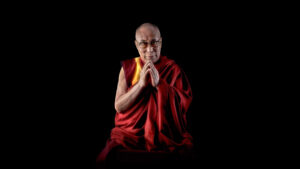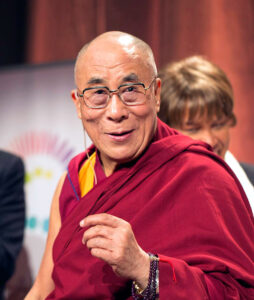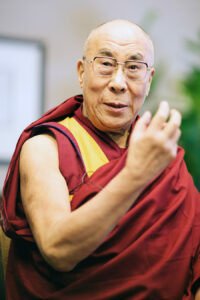Dalai Lama
Credentials
Humanitarian Cause
Other, Mentorship and Spiritual Counseling
Impact Location
Tibet
Occupation
Religious Figure / Founder of The Dalai Lama Trust and Friends of Dalai Lama
Photo Gallery
About Dalai Lama
His Holiness the 14th Dalai Lama, Tenzin Gyatso, prefers to describe himself as a simple Buddhist monk. As the spiritual leader of Tibet, he has dedicated his life to spreading a message of peace, compassion, and universal responsibility. Over the course of his lifetime, His Holiness has received more than 150 awards, honorary doctorates, and prizes, including the Nobel Peace Prize, in recognition of his commitment to non-violence and his advocacy for human rights, environmental responsibility, and interfaith dialogue.
Born on July 6, 1935, in a small farming village in northeastern Tibet, His Holiness was recognized as the reincarnation of the 13th Dalai Lama, Thubten Gyatso, at the age of two. According to Tibetan Buddhist tradition, the Dalai Lamas are considered manifestations of Avalokiteshvara, the Bodhisattva of Compassion and the patron saint of Tibet. These Bodhisattvas vow to return to the world again and again to aid humanity and guide sentient beings toward Buddhahood.
His leadership journey began early. In 1950, when Tibet faced the invasion by Chinese forces, His Holiness was called upon to assume full political responsibility for his country at the age of just 15. Despite efforts to engage diplomatically with Chinese leaders, including meetings with Mao Zedong in Beijing, the situation deteriorated.
By the age of 23, His Holiness had completed his education and earned the Geshe Lharampa degree, the highest level of attainment in Buddhist philosophy, following his final examination during the annual Great Prayer Festival in 1959. The same year, following a violent suppression of a Tibetan uprising by Chinese forces, he was forced to flee into exile. Since that time, His Holiness has lived in Dharamsala, northern India, where he has led the Tibetan government-in-exile and continued his mission of advocating for Tibet’s autonomy and the preservation of its unique culture.
His Holiness led the effort to bring Tibet’s plight to the attention of the world, resulting in the United Nations General Assembly adopting three resolutions on Tibet between 1959 and 1965. He also initiated significant reforms aimed at democratizing the Tibetan administration, introducing a draft for its democratic constitution. By 1990, His Holiness had fully democratized the Tibetan administration in exile, empowering the Tibetan people by enabling them to elect their leaders directly.
His Holiness’s vision for a peaceful resolution to the Tibet-China conflict culminated in the Five-Point Peace Plan he proposed in 1987. This initiative called for Tibet to be transformed into a zone of peace, the cessation of China’s population transfer policy into Tibet, respect for the Tibetan people’s human rights, and the restoration of Tibet’s natural environment. He further elaborated on these ideas during an address to the European Parliament in 1988, where he proposed a self-governing political entity for Tibet that would exist in association with China, while China would retain control over Tibet’s foreign policy and defense.
Throughout his life, His Holiness has been a tireless advocate for peace and non-violence, earning him the Nobel Peace Prize in 1989. He became the first Nobel laureate to be recognized not only for his work in the political realm but also for his concern about global environmental issues. His Holiness has visited over 67 countries and engaged in dialogue with global leaders across different faiths, promoting inter-religious harmony and understanding. His commitment to cross-cultural understanding has extended into scientific inquiry, where since the 1980s he has fostered collaboration between Buddhist monks and modern scientists in fields such as neurobiology, psychology, and quantum physics, ultimately integrating modern science into the curriculum of Tibetan monastic institutions.
In 2011, His Holiness made a historic decision to step down from his political role. He formally transferred his temporal authority to the democratically elected leaders of the Central Tibetan Administration, marking the end of the 368-year-old tradition of Dalai Lamas holding both spiritual and political leadership. His Holiness has since focused solely on spiritual matters, continuing to inspire millions with his teachings on compassion and ethics.
Through his life, His Holiness the 14th Dalai Lama has exemplified the principles of peace, compassion, and non-violence, leaving an indelible mark on the world. Whether engaging in political reform, spiritual teaching, or interfaith dialogue, his legacy is one of profound wisdom and tireless dedication to the well-being of all sentient beings.



